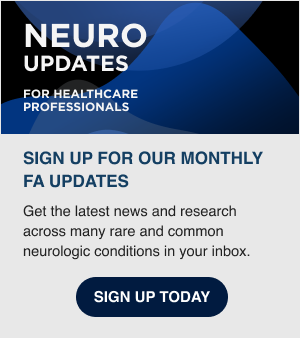Advocating for the FA community as healthcare providers
George Wilmot, MD, PhD, explains how healthcare providers can best advocate for and partner with the Friedreich’s ataxia community.
About George Wilmot, MD, PhD
George Wilmot, MD, PhD, is a board-certified neurologist affiliated with several hospitals, including Emory University Hospital. He also serves as an associate professor at Emory University School of Medicine’s Department of Neurology and adjunct associate professor at the school’s Department of Pediatrics. He is an ataxia clinical researcher and he started the Cooperative Ataxia Registry.
Transcript
Well, I think healthcare providers need to be educated about Friedreich’s: that we have a medicine now that’s FDA-approved for the disease; about all the different manifestations that can happen, you know, like the heart involvement, the diabetes involvement, the orthopedic involvement; the possibilities for having, you know, siblings who are affected because it’s a recessive disease, so genetic counseling can be important; the physical therapy and the need for good and safe exercise.
All of those are really critical things. So I think spreading the word is one way.
The other thing is being involved when appropriate. You know, if you have interest in getting to know the patients and the advocacy groups, partnering with them is a great idea.
The advocacy groups that have done a lot with Friedreich’s — Friedreich’s Ataxia Research Alliance, the Friedreich’s Ataxia Parent Group, the National Ataxia Foundation — have done an awful lot to promote awareness, to promote research, and to promote the highly effective specialized care for Friedreich’s patients.
And I think jumping on board with that and helping out is a great thing to do.
Our FA medical advisor
 David Lynch, MD, PhD, is the director of the Friedreich’s Ataxia Program at Children’s Hospital of Philadelphia.
David Lynch, MD, PhD, is the director of the Friedreich’s Ataxia Program at Children’s Hospital of Philadelphia.

